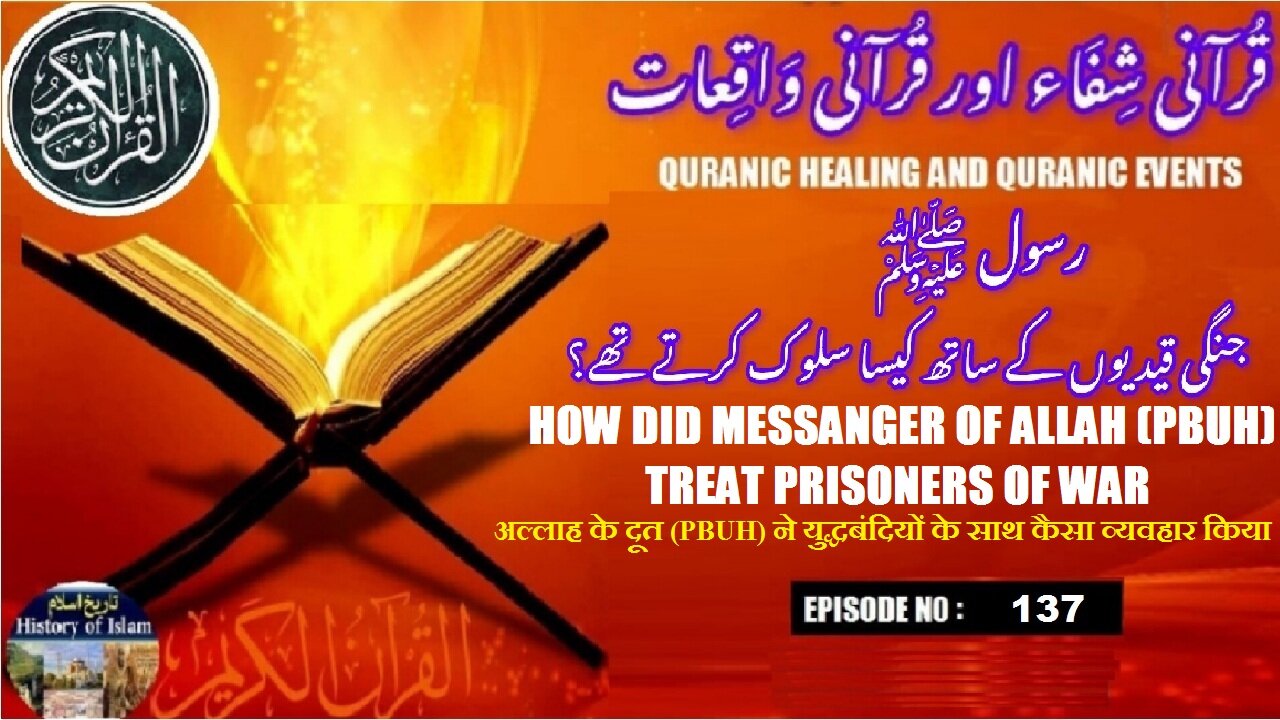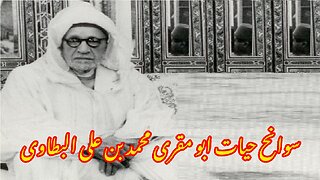Premium Only Content

How Did the (PBUH) Treat Prisoners of War رسول اللہ صلی اللہ علیہ وسلم کا جنگی قیدیوں کے ساتھ سلوک
@islamichistory813 #prophet #treat #prisoners #war #healing #and #events #from #the #quran #historical #stories #and #events #quranicstories #selfhealing #success #stories #striking #events #in #history #quranstories, #storiesfromthequran #religious #creation #stories #trending #quran #short #historical #loves #historical #heroes #what #is #true #strength #calm #quran #recitation #for #babies #islamic #healing
How Did the Prophet (PBUH) Treat Prisoners of War?
Brothers, sisters, friends and elders Assalamu Alaikum, wa Rahmatullahi wa Barakatuhu, we are presenting the 137th episode of the Islamic informative video based on healing and events from the Holy Quran,and in this video we will describe,How Did the Prophet (PBUH) Treat Prisoners of War?
The treatment of prisoners of war (POWs) in Islam, as exemplified by the Prophet Muhammad ?, reflects a remarkable balance between justice, mercy, and wisdom. After the **Battle of Badr**, where the Muslims captured around seventy disbelievers from the Quraysh army, the Prophet ? was faced with the critical decision of how to deal with these prisoners. This moment is addressed directly in **Surah Al-Anfal, verses 67–70**, which provide guidance on the appropriate handling of POWs while also shedding light on the mercy and foresight of the Prophet (PBUH).
Allah says in the Surah Al-Anfal verse 67:
“It is not for a Prophet to have captives [of war] until he has thoroughly subdued the land. You [believers] desire the commodities of this world, but Allah desires [for you] the Hereafter. And Allah is Exalted in Might and Wise.”
This verse was revealed after the Prophet (PBUH) made the decision to ransom many of the prisoners of Badr rather than execute them. Some companions, including Abu Bakr (RA), favored leniency and proposed accepting ransom from the captives, hoping that this might also soften their hearts toward Islam. Others, like Umar ibn al-Khattab (RA), argued for a firmer approach, advocating for their execution to deter future aggression. The Prophet (PBUH) ultimately chose the more compassionate route — taking ransom in exchange for the release of prisoners. However, Allah reminded the Muslims through this verse that the decision was premature, as the Quraysh had not yet been fully subdued, and the motive should not be worldly gain.
Allah continues in the next verse 68 of Surah Al-Anfal:
“Had it not been for a decree from Allah that preceded, you would have been touched for what you took by a great punishment.”
This verse clarifies that had Allah not already decreed mercy and forgiveness, the decision to accept ransom could have resulted in a severe consequence. It was a lesson for the believers: that in matters of justice and warfare, **divine guidance must take precedence over personal feelings or financial benefit. Still, this verse does not condemn the Prophet (PBUH) but rather sets a principle for future military engagements.
Then Allah consoles the Prophet (PBUH) and assures him that his intentions were good: Allah said in Surah Al-Anfal verse 69.
“So consume what you have taken of war booty as being lawful and good, and fear Allah. Indeed, Allah is Forgiving and Merciful.”
Despite the earlier warning, this verse permits the Muslims to benefit from the ransom taken, as long as they maintain their fear of Allah and sincerity of purpose. It shows that Islam does not prohibit material gain, but it must never override the ultimate goal of pleasing Allah and establishing justice.
Finally, Allah praises the prisoners who had good in their hearts and hints at their potential acceptance of Islam in Surah Al-Anfal verse 70:
“O Prophet, say to whoever is in your hands of the captives, ‘If Allah knows [any] good in your hearts, He will give you something better than what was taken from you, and He will forgive you; and Allah is Forgiving and Merciful.’”
This verse reveals the mercy and hope offered even to the enemies of Islam. Many of the prisoners later embraced Islam, including prominent figures like Abu Sufyan, who went on to become companions of the Prophet (PBUH). This policy of compassionate engagement and invitation to Islam, even in times of war, reflects the true character of the Prophet (PBUH).
The Prophet’s treatment of POWs was not only guided by revelation but also by his natural mercy. According to Sahih al-Bukhari Hadith No 3046), the Prophet (PBUH) instructed his companions to treat the prisoners well. Many prisoners later narrated that the Muslims would give them better food than they ate themselves. Some were even released without ransom, especially those who were poor or had shown good character.
In conclusion, the Prophet Muhammad (PBUH)'s treatment of prisoners of war, as explained in Surah Al-Anfal (verses 67–70)and supported by authentic Hadith, was a shining example of justice tempered with mercy. Though he was a commander in a time of war, he never abandoned the principles of compassion, forgiveness, and da’wah. His conduct set a timeless standard for humane treatment of captives and highlighted the moral superiority of Islamic teachings in even the most difficult circumstances.
With this, we ask for your permission until tomorrow and pray to Allah Almighty to grant us the ability to act on the Quran and Hadith, Amen
Allah Hafiz
===================================
-
 7:26
7:26
ISLAMIC HISTORY
4 hours agoBiography of Abu Muqri Muhammad ibn Ali al-Batawi سوانح عمری ابو مقری محمد ابن علی البتاوی
1 -
 1:29:02
1:29:02
Game On!
1 day ago $7.30 earnedTHEY'RE BACK! NFL Wise Guys Return For Week 3 BEST BETS!
59.6K4 -
 6:16
6:16
China Uncensored
6 hours agoHow Trump Plans on Stopping Russia and China—Without Firing a Shot!
217K40 -
 33:13
33:13
Ohio State Football and Recruiting at Buckeye Huddle
18 hours agoOhio State Football: 10 Things We Learned Watching Washington's Win over Colorado State
115K -
 1:14:04
1:14:04
NAG Entertainment
18 hours agoKickback w/ Leon - Rocket League: Road to GC
69.5K -
 30:13
30:13
Degenerate Plays
6 hours ago $0.87 earnedBritish Insults Are Hilarious - Call of Duty: Modern Warfare 2 (2009) : Part 2
42.2K2 -
 6:42
6:42
NAG Daily
22 hours agoCharlie Kirk: His Words. His Vision. His Movement.
60.6K27 -
 21:42
21:42
Jasmin Laine
1 day ago“Kimmel Isn’t a Victim, Charlie Kirk Was”—Gutfeld OBLITERATES Liberal Media Over FAKE Outrage
54.7K34 -
 33:59
33:59
ComedyDynamics
23 days agoBest of Jim Breuer: Let's Clear the Air
95.6K20 -
 2:11:03
2:11:03
Badlands Media
1 day agoDevolution Power Hour Ep. 391: First Principles, Psyops, and Hybrid Warfare
148K186